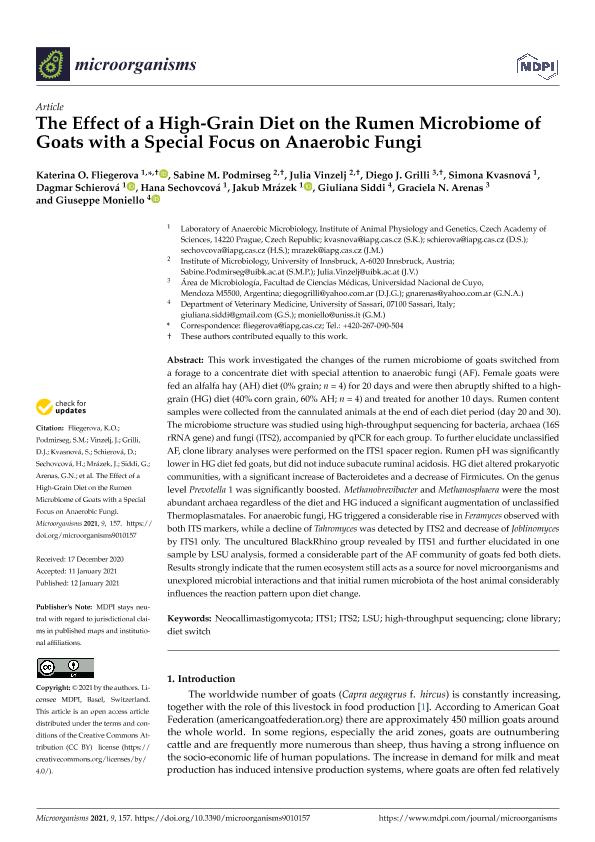Mostrar el registro sencillo del ítem
dc.contributor.author
Fliegerova, Katerina O.
dc.contributor.author
Podmirseg, Sabine M.
dc.contributor.author
Vinzelj, Julia
dc.contributor.author
Grilli, Diego Javier

dc.contributor.author
Kvasnová, Simona
dc.contributor.author
Schierová, Dagmar
dc.contributor.author
Sechovcová, Hana
dc.contributor.author
Mrázek, Jakub
dc.contributor.author
Siddi, Giuliana
dc.contributor.author
Arenas, Graciela Nora

dc.contributor.author
Moniello, Giuseppe
dc.date.available
2022-09-07T15:54:21Z
dc.date.issued
2021-01
dc.identifier.citation
Fliegerova, Katerina O.; Podmirseg, Sabine M.; Vinzelj, Julia; Grilli, Diego Javier; Kvasnová, Simona; et al.; The effect of a high-grain diet on the rumen microbiome of goats with a special focus on anaerobic fungi; Multidisciplinary Digital Publishing Institute; Microorganisms; 9; 1; 1-2021; 1-21
dc.identifier.issn
2076-2607
dc.identifier.uri
http://hdl.handle.net/11336/167759
dc.description.abstract
This work investigated the changes of the rumen microbiome of goats switched from a forage to a concentrate diet with special attention to anaerobic fungi (AF). Female goats were fed an alfalfa hay (AH) diet (0% grain; n = 4) for 20 days and were then abruptly shifted to a high-grain (HG) diet (40% corn grain, 60% AH; n = 4) and treated for another 10 days. Rumen content samples were collected from the cannulated animals at the end of each diet period (day 20 and 30). The microbiome structure was studied using high-throughput sequencing for bacteria, archaea (16S rRNA gene) and fungi (ITS2), accompanied by qPCR for each group. To further elucidate unclassified AF, clone library analyses were performed on the ITS1 spacer region. Rumen pH was significantly lower in HG diet fed goats, but did not induce subacute ruminal acidosis. HG diet altered prokaryotic communities, with a significant increase of Bacteroidetes and a decrease of Firmicutes. On the genus level Prevotella 1 was significantly boosted. Methanobrevibacter and Methanosphaera were the most abundant archaea regardless of the diet and HG induced a significant augmentation of unclassified Thermoplasmatales. For anaerobic fungi, HG triggered a considerable rise in Feramyces observed with both ITS markers, while a decline of Tahromyces was detected by ITS2 and decrease of Joblinomyces by ITS1 only. The uncultured BlackRhino group revealed by ITS1 and further elucidated in one sample by LSU analysis, formed a considerable part of the AF community of goats fed both diets. Results strongly indicate that the rumen ecosystem still acts as a source for novel microorganisms and unexplored microbial interactions and that initial rumen microbiota of the host animal considerably influences the reaction pattern upon diet change.
dc.format
application/pdf
dc.language.iso
eng
dc.publisher
Multidisciplinary Digital Publishing Institute
dc.rights
info:eu-repo/semantics/openAccess
dc.rights.uri
https://creativecommons.org/licenses/by/2.5/ar/
dc.subject
CLONE LIBRARY
dc.subject
DIET SWITCH
dc.subject
HIGH-THROUGHPUT SEQUENCING
dc.subject
ITS1
dc.subject
ITS2
dc.subject
LSU
dc.subject
NEOCALLIMASTIGOMYCOTA
dc.subject.classification
Otras Ciencias Veterinarias

dc.subject.classification
Ciencias Veterinarias

dc.subject.classification
CIENCIAS AGRÍCOLAS

dc.title
The effect of a high-grain diet on the rumen microbiome of goats with a special focus on anaerobic fungi
dc.type
info:eu-repo/semantics/article
dc.type
info:ar-repo/semantics/artículo
dc.type
info:eu-repo/semantics/publishedVersion
dc.date.updated
2022-08-16T20:40:34Z
dc.journal.volume
9
dc.journal.number
1
dc.journal.pagination
1-21
dc.journal.pais
Suiza

dc.journal.ciudad
Basilea
dc.description.fil
Fil: Fliegerova, Katerina O.. Czech Academy of Sciences; República Checa
dc.description.fil
Fil: Podmirseg, Sabine M.. Universidad de Innsbruck; Austria
dc.description.fil
Fil: Vinzelj, Julia. Universidad de Innsbruck; Austria
dc.description.fil
Fil: Grilli, Diego Javier. Consejo Nacional de Investigaciones Científicas y Técnicas. Centro Científico Tecnológico Conicet - Mendoza; Argentina. Universidad Nacional de Cuyo. Facultad de Cs.médicas. Departamento de Patología. Area de Microbiología; Argentina
dc.description.fil
Fil: Kvasnová, Simona. Czech Academy of Sciences; República Checa
dc.description.fil
Fil: Schierová, Dagmar. Czech Academy of Sciences; República Checa
dc.description.fil
Fil: Sechovcová, Hana. Czech Academy of Sciences; República Checa
dc.description.fil
Fil: Mrázek, Jakub. Czech Academy of Sciences; República Checa
dc.description.fil
Fil: Siddi, Giuliana. Università degli Studi di Sassari; Italia
dc.description.fil
Fil: Arenas, Graciela Nora. Universidad Nacional de Cuyo. Facultad de Cs.médicas. Departamento de Patología. Area de Microbiología; Argentina
dc.description.fil
Fil: Moniello, Giuseppe. Università degli Studi di Sassari; Italia
dc.journal.title
Microorganisms
dc.relation.alternativeid
info:eu-repo/semantics/altIdentifier/url/https://www.mdpi.com/2076-2607/9/1/157
dc.relation.alternativeid
info:eu-repo/semantics/altIdentifier/doi/https://doi.org/10.3390/microorganisms9010157
Archivos asociados
